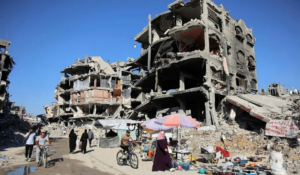Israelis must ask themselves if they’re willing to live in a country that lives on blood

People and heavily damaged buildings in a displaced persons camp in Jabalya in the northern Gaza Strip, 15 September 2024
Gideon Levy writes in Haaretz on 15 September 2024:
Israel is turning, with alarming speed, into a country that lives on blood. The daily crimes of the occupation are already less relevant. Over the past year, a new reality of mass killing and crimes of an entirely different scale has emerged. We are in a genocidal reality; the blood of tens of thousands of people has flowed.
This is the time that all Israelis should ask themselves if they are willing to live in a country that lives on blood. Just don’t say that there is no choice – of course there is – but first we must ask whether we are even prepared to live like this.
Are we, the Israelis, willing to live in the only country in the world whose existence is based on blood? The only vision that is widespread in Israel now is to live from one war to another war, from one bloodletting to the next, from massacre to massacre, with intervals spaced as widely as possible.
No other vision is on the table. Hopeful people promise long intervals, while the right promises a permanent blood-soaked reality: war, mass killing, systematic violation of international law, a pariah state, repeating in an endless cycle.
The Palestinians will continue to be massacred, and Israelis will continue to close their eyes to it? Hard to believe. A time will come when more Israelis will open their eyes and recognize that their country subsists on blood. Without bloodshed, we are told, we have no existence – and we make our peace with this horrific statement.
We not only believe that such a country can exist forever, we are convinced that without the blood offering, it has no existence. Every three years, a bloodletting in Gaza, every four years, in Lebanon. In between, there is the West Bank, and, occasionally, a blood sortie to additional targets. There is no other country like it in the world.
Blood cannot be the country’s fuel. Just as no one would imagine driving a car that is powered by blood, no matter how cheap, it is difficult to imagine 10 million residents willing to live in a country that runs on blood. The war in Gaza is a watershed. Is this how we will continue?
The media tries to sell us that this is a necessity. Through campaigns that demonize and dehumanize the Palestinians, a unified and monstrous chorus of commentators is successfully selling us the idea that we can live for eternity on blood. “We will mow the grass” in Gaza every two years – we will execute generation after generation of young regime opponents, imprison tens of thousands of people in concentration camps, we will expel, cull, expropriate and, of course, kill, and that is how we will live: in the country of blood.
We have already killed the Palestinian people. We began with the mass killing in Gaza, and now we have turned to the West Bank. Blood will be shed in gallons there too, if no one stops the battalion. The killing is both physical and emotional. Nothing is left of Gaza now.
The detainees, the orphans, the traumatized, the homeless, will never return to what they were. The dead certainly will not. It will take generations for Gaza to recover, if it even can. This is genocide, even if it does not meet the legal definition. A country cannot live on such an ideology, certainly not when it intends to continue doing so.
Let’s assume the world continues to allow it. The question is whether we, the Israelis, are willing to allow it. How long we can live with the knowledge that our existence depends on blood. When will we ask whether there genuinely is no alternative to a country of blood? After all, there is no other country like this.
Israel has never seriously tried another way. It was programmed and directed to behave as a country that lives off blood, even more so after October 7. As if that terrible day, after which everything is permissible, sealed its fate as a country of blood.
The fact is that no other possibility has been raised for discussion. But a country of blood is not an option, just as a blood-fueled car is not an option. When we realize this, we will begin looking for the alternatives, if only for lack of any other option. They are there, and they are waiting for a test drive. They may surprise us, but in the present reality, it is impossible even to suggest them.
This article is reproduced in its entirety
